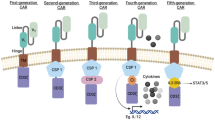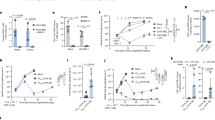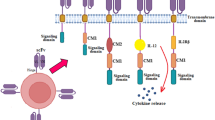Abstract
Since the introduction of the use of chimeric antigen receptor T-cell therapy (CAR-T therapy) dramatically changed the therapeutic strategy for B cell tumors, various CAR-T cell products have been developed and applied to myeloid and solid tumors. Although viral vectors have been widely used to produce genetically engineered T cells, advances in genetic engineering have led to the development of methods for producing non-viral, gene-modified CAR-T cells. Recent progress has revealed that non-viral CAR-T cells have a significant impact not only on the simplicity of the production process and the accessibility of non-viral vectors but also on the function of the cells themselves. In this review, we focus on piggyBac-transposon-based CAR-T cells among non-viral, gene-modified CAR-T cells and discuss their characteristics, preclinical development, and recent clinical applications.

Similar content being viewed by others
Data Availability
Data available on request from the authors.
References
Hacein-Bey-Abina S, von Kalle C, Schmidt M et al (2003) A serious adverse event after successful gene therapy for X-linked severe combined immunodeficiency. N Engl J Med 348:255–256
Hacein-Bey-Abina S, Von Kalle C, Schmidt M et al (2003) LMO2-associated clonal T cell proliferation in two patients after gene therapy for SCID-X1. Science 302:415–419
Cornetta K, Duffy L, Turtle CJ et al (2018) Absence of replication-competent lentivirus in the clinic: analysis of infused T cell products. Mol Ther 26:280–288
Marcucci KT, Jadlowsky JK, Hwang WT et al (2018) Retroviral and lentiviral safety analysis of gene-modified T cell products and infused HIV and oncology patients. Mol Ther 26:269–279
Wilson MH, Coates CJ, George AL (2007) PiggyBac transposon-mediated gene transfer in human cells. Mol Ther 15:139–145
Ding S, Wu X, Li G et al (2005) Efficient transposition of the piggyBac (PB) transposon in mammalian cells and mice. Cell 122:473–483
Fraser MJ, Smith GE, Summers MD (1983) Acquisition of host cell DNA sequences by baculoviruses: relationship between host DNA insertions and FP mutants of Autographa californica and Galleria mellonella nuclear polyhedrosis viruses. J Virol 47:287–300
Fraser MJ, Ciszczon T, Elick T et al (1996) Precise excision of TTAA-specific lepidopteran transposons piggyBac (IFP2) and tagalong (TFP3) from the baculovirus genome in cell lines from two species of Lepidoptera. Insect Mol Biol 5:141–151
Lobo N, Li X, Fraser MJ Jr (1999) Transposition of the piggyBac element in embryos of Drosophila melanogaster, Aedes aegypti and Trichoplusia ni. Mol Gen Genet 261:803–810
Wu SC, Meir YJ, Coates CJ et al (2006) piggyBac is a flexible and highly active transposon as compared to sleeping beauty, Tol2, and Mos1 in mammalian cells. Proc Natl Acad Sci USA 103:15008–15013
Meir YJ, Lin A, Huang MF et al (2013) A versatile, highly efficient, and potentially safer piggyBac transposon system for mammalian genome manipulations. FASEB J 27:4429–4443
Nakazawa Y, Huye LE, Dotti G et al (2009) Optimization of the PiggyBac transposon system for the sustained genetic modification of human T lymphocytes. J Immunother 32:826–836
Saito S, Nakazawa Y, Sueki A et al (2014) Anti-leukemic potency of piggyBac-mediated CD19-specific T cells against refractory Philadelphia chromosome-positive acute lymphoblastic leukemia. Cytotherapy 16:1257–1269
Nakazawa Y, Huye LE, Salsman VS et al (2011) PiggyBac-mediated cancer immunotherapy using EBV-specific cytotoxic T-cells expressing HER2-specific chimeric antigen receptor. Mol Ther 19:2133–2143
Ramanayake S, Bilmon I, Bishop D et al (2015) Low-cost generation of good manufacturing practice-grade CD19-specific chimeric antigen receptor-expressing T cells using piggyBac gene transfer and patient-derived materials. Cytotherapy 17:1251–1267
Bishop DC, Xu N, Tse B et al (2018) PiggyBac-engineered T cells expressing CD19-specific CARs that lack IgG1 Fc spacers have potent activity against B-ALL xenografts. Mol Ther 26:1883–1895
Morita D, Nishio N, Saito S et al (2018) Enhanced expression of Anti-CD19 chimeric antigen receptor in piggyBac transposon-engineered T Cells. Mol Ther Methods Clin Dev 8:131–140
Huye LE, Nakazawa Y, Patel MP et al (2011) Combining mTor inhibitors with rapamycin-resistant T cells: a two-pronged approach to tumor elimination. Mol Ther 19:2239–2248
Manuri PVR, Wilson MH, Maiti SN et al (2010) PiggyBac transposon/transposase system to generate CD19-specific T cells for the treatment of B-lineage malignancies. Hum Gene Ther 21:427–437
Yang LR, Li L, Meng MY et al (2021) Evaluation of piggyBac-mediated anti-CD19 CAR-T cells after ex vivo expansion with aAPCs or magnetic beads. J Cell Mol Med 25:686–700
Du Z, Ng YY, Zha S et al (2021) piggyBac system to co-express NKG2D CAR and IL-15 to augment the in vivo persistence and anti-AML activity of human peripheral blood NK cells. Mol Ther Methods Clin Dev 23:582–596
Tay JCK, Wang J, Du Z et al (2021) Manufacturing NKG2D CAR-T cells with piggyBac transposon vectors and K562 artificial antigen-presenting cells. Mol Ther Methods Clin Dev 21:107–120
Jiang G, Ng YY, Tay JCK et al (2022) Dual CAR-T cells to treat cancers co-expressing NKG2D and PD1 ligands in xenograft models of peritoneal metastasis. Cancer Immunol Immunother. https://doi.org/10.1007/s00262-022-03247-9
Kubo H, Yagyu S, Nakamura K et al (2021) Development of non-viral, ligand-dependent, EPHB4-specific chimeric antigen receptor T cells for treatment of rhabdomyosarcoma. Mol Ther Oncolytics 20:646–658
Nakamura K, Yagyu S, Hirota S et al (2021) Autologous antigen-presenting cells efficiently expand piggyBac transposon CAR-T cells with predominant memory phenotype. Mol Ther Methods Clin Dev 21:315–324
Suematsu M, Yagyu S, Nagao N et al (2022) PiggyBac transposon-mediated CD19 chimeric antigen receptor-T cells derived from CD45RA-positive peripheral blood mononuclear cells possess potent and Sustained antileukemic function. Front Immunol 13:770132
Suematsu M, Yagyu S, Yoshida H et al (2022) Targeting FLT3-specific chimeric antigen receptor T cells for acute lymphoblastic leukemia with KMT2A rearrangement. Cancer Immunol Immunother. https://doi.org/10.1007/s00262-022-03303-4
Nishio N, Hanajiri R, Ishikawa Y et al (2021) A phase I study of CD19 chimeric antigen receptor-T cells generated by the PiggyBac Transposon vector for acute lymphoblastic leukemia. Blood 138:1381
Hamada M, Nishio N, Okuno Y et al (2018) Integration mapping of piggyBac-mediated CD19 chimeric antigen receptor T cells analyzed by novel tagmentation-assisted PCR. EBioMedicine 34:18–26
Costello C, Derman B, Kocoglu M et al (2021) Clinical trials of BCMA-targeted CAR-T cells utilizing a novel non-viral transposon system. Blood 138:3858
Ritchie DS, Neeson PJ, Khot A et al (2013) Persistence and efficacy of second generation CAR T cell against the LeY antigen in acute myeloid leukemia. Mol Ther 21:2122–2129
Wang Q-S, Wang Y, Lv H-Y et al (2015) Treatment of CD33-directed chimeric antigen receptor-modified T cells in one patient with relapsed and refractory acute myeloid leukemia. Mol Ther 23:184–191
Tambaro FP, Singh H, Jones E et al (2021) Autologous CD33-CAR-T cells for treatment of relapsed/refractory acute myelogenous leukemia. Leukemia 35:3282–3286
Cui Q, Qian C, Xu N et al (2021) CD38-directed CAR-T cell therapy: a novel immunotherapy strategy for relapsed acute myeloid leukemia after allogeneic hematopoietic stem cell transplantation. J Hematol Oncol 14:82
Sallman DA, Brayer J, Sagatys EM et al (2018) NKG2D-based chimeric antigen receptor therapy induced remission in a relapsed/refractory acute myeloid leukemia patient. Haematologica 103:e424–e426
Baumeister SH, Murad J, Werner L et al (2019) Phase I trial of autologous CAR T cells targeting NKG2D ligands in patients with AML/MDS and multiple myeloma. Cancer Immunol Res 7:100–112
Zhang H, Wang P, Li Z et al (2021) Anti-CLL1 chimeric antigen receptor T-cell therapy in children with relapsed/refractory acute myeloid leukemia. Clin Cancer Res 27:3549–3555
Nakazawa Y, Matsuda K, Kurata T et al (2016) Anti-proliferative effects of T cells expressing a ligand-based chimeric antigen receptor against CD116 on CD34+ cells of juvenile myelomonocytic leukemia. J Hematol Oncol. https://doi.org/10.1186/s13045-016-0256-3
Hasegawa A, Saito S, Narimatsu S et al (2021) Mutated GM-CSF-based CAR-T cells targeting CD116/CD131 complexes exhibit enhanced anti-tumor effects against acute myeloid leukaemia. Clin Transl Immunol 10:e1282
Morokawa H, Yagyu S, Hasegawa A et al (2020) Autologous non-human primate model for safety assessment of piggyBac transposon-mediated chimeric antigen receptor T cells on granulocyte-macrophage colony-stimulating factor receptor. Clin Transl Immunol 9:e1207
Lopez AF, Shannon MF, Hercus T et al (1992) Residue 21 of human granulocyte-macrophage colony-stimulating factor is critical for biological activity and for high but not low affinity binding. EMBO J 11:909–916
Ghorashian S, Kramer AM, Onuoha S et al (2019) Enhanced CAR T cell expansion and prolonged persistence in pediatric patients with ALL treated with a low-affinity CD19 CAR. Nat Med 25:1408–1414
Zhang Y, Zhang Z, Ding Y et al (2021) Phase I clinical trial of EGFR-specific CAR-T cells generated by the piggyBac transposon system in advanced relapsed/refractory non-small cell lung cancer patients. J Cancer Res Clin Oncol 147:3725–3734
Slovin S, Dorff T, Falchook G et al (2022) A phase I/II study of sitravatinib combined with nivolumab in patients with advanced clear cell renal cancer that progressed on prior anti-angiogenic therapy. J Clin Oncol 40:98
Shioya K, Matsumura T, Ohira Y et al (2022) Development of piggyBac transposon-mediated HER2-CAR-T cells for the treatment of solid tumors. Cancer Res 82:5570
Morgan RA (2013) Faster, cheaper, safer, T-cell engineering. J Immunother 36:1–2
Bishop DC, Clancy LE, Simms R et al (2021) Development of CAR T-cell lymphoma in 2 of 10 patients effectively treated with piggyBac-modified CD19 CAR T cells. Blood 138:1504–1509
Micklethwaite KP, Gowrishankar K, Gloss BS et al (2021) Investigation of product-derived lymphoma following infusion of piggyBac-modified CD19 chimeric antigen receptor T cells. Blood 138:1391–1405
Park J, Daniels J, Wartewig T et al (2021) Integrated genomic analyses of cutaneous T-cell lymphomas reveal the molecular bases for disease heterogeneity. Blood 138:1225–1236
Daniels J, Choi J (2021) BACH2 is a putative T-cell lymphoma tumor suppressor that may play a role in product-derived CAR T-cell lymphomas. Blood 138:2731–2733
Tsukumo S, Unno M, Muto A et al (2013) Bach2 maintains T cells in a naive state by suppressing effector memory-related genes. Proc Natl Acad Sci USA 110:10735–10740
Cesana D, Santoni de Sio FR, Rudilosso L et al (2017) HIV-1-mediated insertional activation of STAT5B and BACH2 trigger viral reservoir in T regulatory cells. Nat Commun 8:498
Lin Z, Liu X, Liu T et al (2021) Evaluation of nonviral piggyBac and lentiviral vector in functions of CD19chimeric antigen receptor T cells and their antitumor activity for CD19(+) tumor cells. Front Immunol 12:802705
Zhang Z, Jiang D, Yang H et al (2019) Modified CAR T cells targeting membrane-proximal epitope of mesothelin enhances the antitumor function against large solid tumor. Cell Death Dis 10:476
Kastankova I, Stach M, Zizkova H et al (2021) Enzymatically produced piggyBac transposon vectors for efficient non-viral manufacturing of CD19-specific CAR T cells. Mol Ther Methods Clin Dev 23:119–127
Stach M, Ptackova P, Mucha M et al (2020) Inducible secretion of IL-21 augments anti-tumor activity of piggyBac-manufactured chimeric antigen receptor T cells. Cytotherapy 22:744–754
Ptackova P, Musil J, Stach M et al (2018) A new approach to CAR T-cell gene engineering and cultivation using piggyBac transposon in the presence of IL-4, IL-7 and IL-21. Cytotherapy 20:507–520
Wang J, Lupo KB, Chambers AM et al (2018) Purinergic targeting enhances immunotherapy of CD73(+) solid tumors with piggyBac-engineered chimeric antigen receptor natural killer cells. J Immunother Cancer 6:136
He J, Zhang Z, Lv S et al (2018) Engineered CAR T cells targeting mesothelin by piggyBac transposon system for the treatment of pancreatic cancer. Cell Immunol 329:31–40
Li H, Huang Y, Jiang DQ et al (2018) Antitumor activity of EGFR-specific CAR T cells against non-small-cell lung cancer cells in vitro and in mice. Cell Death Dis 9:177
Wang P, Qin W, Liu T et al (2020) PiggyBac-engineered T cells expressing a glypican-3-specific chimeric antigen receptor show potent activities against hepatocellular carcinoma. Immunobiology 225:151850
Tomida A, Yagyu S, Nakamura K et al (2021) Inhibition of MEK pathway enhances the antitumor efficacy of chimeric antigen receptor T cells against neuroblastoma. Cancer Sci 112:4026–4036
Yagyu S, Mochizuki H, Yamashima K et al (2021) A lymphodepleted non-human primate model for the assessment of acute on-target and off-tumor toxicity of human chimeric antigen receptor-T cells. Clin Transl Immunol. https://doi.org/10.1002/cti2.1291
Tanaka K, Kato I, Tanaka M et al (2020) Direct delivery of piggyBac CD19 CAR T cells has potent anti-tumor activity against all cells in CNS in a xenograft mouse model. Mol Ther Oncolytics 18:37–46
Ma Y, Chen Y, Yan L et al (2020) EGFRvIII-specific CAR-T cells produced by piggyBac transposon exhibit efficient growth suppression against hepatocellular carcinoma. Int J Med Sci 17:1406–1414
Dolnikov A, Shen S, Klamer G et al (2015) Antileukemic potency of CD19-specific T cells against chemoresistant pediatric acute lymphoblastic leukemia. Exp Hematol 43(1001–1014):e1005
Xu JY, Ye ZL, Jiang DQ et al (2017) Mesothelin-targeting chimeric antigen receptor-modified T cells by piggyBac transposon system suppress the growth of bile duct carcinoma. Tumour Biol 39:1010428317695949
Li C, Sun Y, Wang J et al (2021) PiggyBac-Generated CAR19-T Cells plus lenalidomide cause durable complete remission of triple-hit refractory/relapsed DLBCL: a case report. Front Immunol 12:599493
Acknowledgements
The authors thank Drs. Miyuki Tanaka, Shoji Saito, Koichi Hirabayashi, Aiko Hasegawa, Yoichi Inada, Konomi Morita, Kayoko Nakamura, Hiroshi Kubo, Akimasa Tomida, and Masaya Suematsu for their tremendous work in the development of PB-based CAR-T cells. The authors also thank Editage for proofreading the manuscript. This work was supported by the Japan Agency for Medical Research and Development (AMED; 22ck0106659s0102, 22ck0106574h0003), and JSPS KAKENHI (20K07461).
Author information
Authors and Affiliations
Corresponding author
Ethics declarations
Conflict of interest
Shigeki Yagyu is the chief executive officer of A-SEEDS Inc. Yozo Nakazawa is the executive director of A-SEEDS Inc. with equity. Shigeki Yagyu and Yozo Nakazawa have patent applications in the field of adoptive cell therapy for cancer.
Additional information
Publisher's Note
Springer Nature remains neutral with regard to jurisdictional claims in published maps and institutional affiliations.
About this article
Cite this article
Yagyu, S., Nakazawa, Y. piggyBac-transposon-mediated CAR-T cells for the treatment of hematological and solid malignancies. Int J Clin Oncol 28, 736–747 (2023). https://doi.org/10.1007/s10147-023-02319-9
Received:
Accepted:
Published:
Issue Date:
DOI: https://doi.org/10.1007/s10147-023-02319-9




